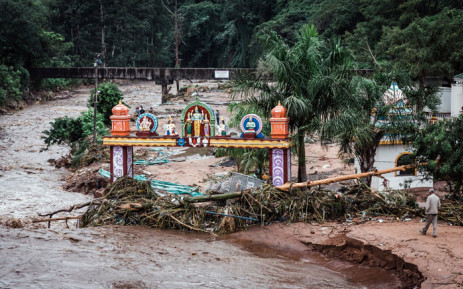With the floods having already claimed over 50 lives in the past days, Glen Tyler-Davies from climate activist group 350Africa.org said:
“This tragic loss of life is horrific to hear about, and our thoughts go out to those who have lost family members and loved ones in these floods. These disasters bring home the horrendous inequality in our society where poor people are more at risk, and less able to insulate themselves from these shocks.

This picture shows the Umhlatuzana Hindu Temple, south of Durban, damaged after the township was hit by heavy rain and flash floods following torrential downpour on 23 April 2019. Picture: AFP
While no one weather event can be linked directly to climate change, these types of extreme weather events are predicted, by climate scientists, to become more severe as the world warms. Indeed, as our neighbouring country, Mozambique still reels from the impact of cyclone Idai, forecasts of damage from tropical cyclone Kenneth are already circulating, as the storm is expected to hit that country after passing over Madagascar today.
With the exception of South Africa, African countries have done relatively little to contribute to climate change, yet are being severely impacted and have little to no resources to cope with the aftermath. Less developed African countries are a natural disaster away from sinking into abject poverty and unjust, almost criminal social conditions, exacerbated by climate change. They need to be equipped to deal with the impacts of extreme weather but with a lack of adaptation measures, it’s near impossible to absorb and recover from the impact.
Fossil fuels have been identified as one of the primary drivers of climate change – we must demand a rapid phase-out of fossil fuel energy. The prospect of new coal-fired power stations being included in South Africa’s energy plan is illogical, as the death toll from extreme weather events further mounts.”
